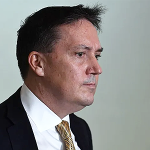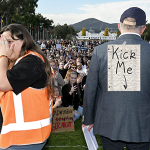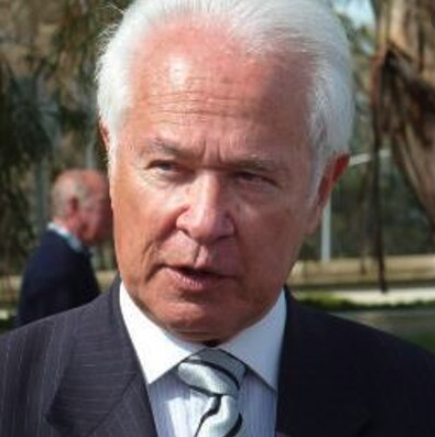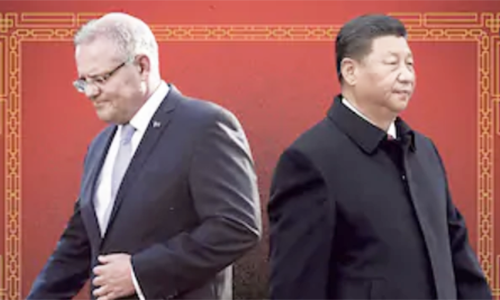
by DAVID FLINT – IF THE Voice referendum fails, international investors, already closely watching the debate, will question whether Australia is a “fair place”, claims Wesfarmers chairman, Michael Chaney.
But other CEOs challenged his assertion that they “universally” agreed with him.
- Like every other “solution” in the past six decades, the Voice will only worsen the gap.
- But Albanese has meekly surrendered to the “indigenous establishment”.
- There’s good reason to believe Australians are still a wise constitutional people.
Meanwhile, Prime Minister Anthony Albanese dismissed opponents as “chicken littles”, belittling them by suggesting they’ll soon claim the Voice will fade the curtains.
Once playing down the unprecedented insertion of a new chapter into the constitution as just “good manners” responding to a “modest and gracious request”, he let the cat out of the bag when he admitted that only a brave government would defy the Voice.
SURRENDERED
Albanese then surrendered meekly when the indigenous establishment indicated they’d brook no limitation on the Voice, even the one proposed by his Attorney-General.
Recently delivering the Lowitja O’Donoghue Oration, Albanese changed direction by declaring that “we shouldn’t content ourselves” with precisely what he once asserted, that it was “a modest change”.
Is he now admitting the obvious, that next to the politicians’ republic, this is the most momentous and far-reaching constitutional change ever proposed?
While likely to make the country next to ungovernable, the last thing the Voice will achieve will be to close the gap. Like every other “solution” in the past six decades, it will only worsen this.
This growing desperation in the Yes camp mirrors the 1999 Republic referendum, particularly when it dawned on them that their case was extremely weak with, as Bob Hawke admitted, the monarchists “winning the intellectual argument”.
There is probably also a growing realisation that with a referendum, fraud is less effective.
A classic example of their panic was in having the two politicians whose duel to the death precipitated the 1975 political referendum crisis, Gough Whitlam and Malcolm Fraser, appear together in a bizarre TV advertisement, agreeing that “It’s Time” for the Keating-Turnbull republic. Pro-constituational monarchists found this served to boost the No vote.
Just as increasingly wild claims are being made for the Voice even by a sitting judge, so in 1999, the arguments for change became increasingly unbelievable.
EMBARRASSED
The one which most embarrassed republicans was Al Grassby’s claim that not only did the monarchy cause the recession, the one million unemployed, and the brain drain, but that all would be cured with the advent of the politicians’ republic.
The Arts Council general manager, Michael Lynch, declared the monarchy stifled artistic talent and prevented our artists from fully expressing themselves, while the conductor of the Australian Opera and Ballet Orchestra, Simone Young, thought a republic would stop her and Australian artists settled in the UK being “thought of in other countries” as British.
As Fawlty Towers’ Manuel would say, ‘Qué?’
After six decades of silence, former High Court judge Anthony Mason even blamed his republicanism on the bodyline cricket series.
Bill Ferris, former Australian Trade Commission chairman, declared our “constitutional arrangements” harmful to the overseas promotion of our products and services, while Lindsay Fox saw a republic as an opportunity for Australia to “re-image” and “re-brand”.
Former NSW premier Neville Wran claimed a republic would “boost jobs” and “invigorate spirits”.
Former diplomat, Richard Woolcott, said he spent many hours unsuccessfully trying to explain our “confusing” constitution.
And because the French were also “confused”, former Brisbane lord mayor and trade commissioner to France, Sallyanne Atkinson, also wanted republican change.
“Confusion” among Asians about the Queen’s portrait hanging in our embassies was a factor in Janet Holmes à Court calling for a new flag and new constitution.
Her determination was strengthened when an Asian cabinet minister told her that his country would help the Australian people in their struggle for independence from Britain.
ASIAN
Former Sydney deputy lord mayor Henry Tsang found it “embarrassing” to explain to Asian businessmen “why Australia is close to the Queen” when “England is a small nation on its way down”.
Not being a republic, he said, was holding back Asian investment and immigration.
A small minority of foreigners living in Australia even insisted the constitution be changed before they would graciously accept our citizenship.
This attitude had been caricatured in a cartoon in The Australian newspaper before the republican debate.
A cranky-looking immigrant comes down a gangplank onto a quay where the Australian flag is flying.
An eager Australian says, “Welcome to Australia, mate. Is there anything we can do?” The immigrant snarls, “The first thing you can do is change that bloody flag”.
Two university teachers told me they would not become Australian while Elizabeth was our Queen. One, an Irish woman, admitted, somewhat sheepishly, that she already had a British passport.
Paul McGeough, the Irish editor of The Sydney Morning Herald insisted:
“As soon as this country stands on its own two feet with its own Head of State, and becomes a real country, then I’ll become a citizen of it.”
Sinn Fein leader, Gerry Adams, visiting Australia during the referendum campaign, urged Australians to vote Yes. ACM’s calls to the republican movement to disassociate themselves were ignored.
WORSE
Professor Greg Craven warned that in the event of a No vote, something worse would be imposed, a directly elected president.
But a careful analysis of votes for and at the Convention demonstrates this is yet another republican myth.
Paul Keating wanted a Yes vote because, he claimed, the constitution was drafted and imposed by the British Foreign Office.
Not embarrassed when this was exposed as manifestly untrue, he then claimed the republic was only about having an Australian as Head of State. He remained silent when we pointed out that the first Australian as Head of State, Sir Isaac Isaacs, was sworn in 92 years ago.
These desperate arguments did not succeed. Nor will similar ones today.
There is good reason to believe that Australians are still a wise constitutional people.PC













I still think a lot of people are missing the main point of this idea of the Voice and getting it into the constitution. Once there this country will always be under the control of the activists/Labor/socialists. (I know I’m repeating myself) It won’t matter what Government is in power, the “Voice” will always have the final say. No law or legislation will be passed without the imprimatur of the “Voice”. That is why Albanese is, so hell bent on getting into the constitution.
Ask why one of the first new appointments by the socialist Labor Albanese Government was the Ambassador for First Nations to the UN.
Reparations is one example of future negotiations if the race based divisive Voice proposal is passed.
Voice + Treaty + Truth telling
During the 1990s “recession we had to have” according to Labor, the worst recession in 60 years (since Great Depression), caused by the economy overheating as the banking and finance sector was deregulated from 1985, and no specific government watchdog created, the Howard Government created Australian Prudential Regulatory Authority in 1998, there was a lot of controversy relating to “sacred sites” claims by Aboriginal groups that effectively had held up new mining projects for years and at enormous expense to investors.
At a Budget breakfast meeting at a major Sydney CBD based firm of accountants a senior mining industry executive was the guest speaker. He spoke about economic prosperity and foreign investment in Australia. One of his main points was that takes more than a decade before adverse impacts on economic prosperity become a noticeable problem for most people. He was referring to Native Title negotiations and tactics like sacred site claims discouraging foreign investors.
I wonder what the mining industry is saying today about effectively “super profits tax” imposed, notably by the Labor Queensland Government?
Now consider the proposed Voice + Treaty + Truth telling referendum to lock so called Voice into The Australian Constitution. A new “advisory group” of unelected Indigenous Australians to Parliament. But they wont be elected, says Warren Mundine, “Direct elections were rejected in the Co-Design Report.”
“Members will be determined collectively by community organisations. A small minority of Aboriginals join community organisations. The Voice wont represent most Aboriginals or any First Nation.”
Warren also pointed out;
“The Uluru Statement was adopted at a convention at a Yulara resort, 25 km from Uluru. I and others have spoken to Anangu elders angry it was named for their country, because it’s not their culture.”
“The convention was attended by 250 delegates, hand-picked from about a dozen community Dialogues (at which attendance was capped at 100, with 60 reserved for First Nations groups – and invitations – only aimed to ensure consensus).”
“And, still, a minority of convention delegates rejected it and walked out. Hardly groundswell support.”